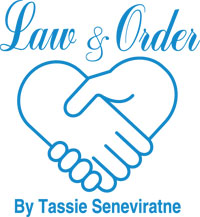Sunday Times 2
Sovereignty of the people: Is the Govt. acting lawfully?
View(s):The Constitution is the supreme law of the Democratic Socialist Republic of Sri Lanka. Sovereignty of the People is guaranteed by the Constitution. If Sovereignty of the People is denied, then governance becomes unlawful.
The Constitution also lays down separation of powers in the organs of the Government to wit: The Legislature, the Executive and the Judiciary. The Legislature makes laws, the Executive enforces them and the Judiciary applies them to relevant cases arising out of the breach of law. That is generally the mode of governance as in other democracies.
 As regards Sovereignty of the People, the Constitution is good only if it is worked to be good. But when the actual working of the Government is irrespective of the Constitution, then Sovereignty of the People is subverted. This regrettably appears to be the deplorable state of affairs in this country. Working of the Government organs then is desultory of Law and Order.
As regards Sovereignty of the People, the Constitution is good only if it is worked to be good. But when the actual working of the Government is irrespective of the Constitution, then Sovereignty of the People is subverted. This regrettably appears to be the deplorable state of affairs in this country. Working of the Government organs then is desultory of Law and Order.
While the concern here is whether the Government is acting lawfully, the further concern is whether the Government and its organs are acting in violation of the Constitutional provision on Sovereignty of the People. This is a vital consideration in the context of Law and Order for the people. There is a serious breakdown in this respect at the hands of the Legislature, the Executive and the Judiciary. These three government organs are in grave breach of this Constitutional requirement for Sovereignty of the People. Only a few examples will be given in illustration due to space considerations.
The Law for Conciliation Boards which is manifestly for Sovereignty of the People and was working smoothly, was opposed by the Judiciary and the legal fraternity, and later rescinded by the Legislature in blatant violation of Sovereignty of the People. The Administration of Justice Law (AJL) of 1973 which was to serve the Sovereignty of the People was, likewise, opposed by the courts and the legal fraternity and later revoked by the Legislature in 1978, with change of government. There are many other examples in which the changes serve lesser sovereignties than Constitutional Sovereignty. Now, blatantly violating democratic principles, the 20th Amendment has been foisted on the people. The Judiciary and the Auditor General have been made subservient to the Executive President. Sovereignty of the People has, thereby, been reduced to only a lip service. The Constitution being the supreme law of the country, its transgression is a serious offence against the State.
Law and order are now at crossroads at this point of time. Law is turning left. Order is turning right. At the junction point are the Police representing the Sovereignty of the People. The Police are much confused as to how they should move them all forward. There is a mix here, a mix of the Sovereignty of the People reposed with the Police, mixed by the organs of government. The mix is made through all four roads leading to this point. The Police are embarrassed at the junction crossing. Fortunately, however, the embarrassment to the Police does not show because they are wearing face masks. These face masks serve the Police a symbolic purpose, unintended though, to cover their discomfiture.
Although the Constitution lays down that the Supreme Court shall be the highest and final Superior Court, being subservient to the Executive President, its powers are pruned, and in reality, the President has acquired for himself unfettered monarchical powers. All these bear heavily on the Police tasked with law and order to serve Sovereignty of the People. The only hope is then that future Constitutions will consider these contradictions.
Little wonder, that when I asked a constitutional lawyer about challenging the usurpation of the People’s Sovereignty in courts, the reply was, “Courts, Tassie are you dreaming?” A derisive comment doing the rounds these days in social media is ‘Keekaru adhikaranaya’ (Obedient Judiciary).
It is thus a vicious circle, with no remedy within sight. All that the people can do is to exclaim with a groan, “Bloody Hell!” or rise up in unison and fight for rights.
(The writer is a Retired Senior Superintendent of Police. He can be contacted at seneviratnetz@gmail.com; phone 077 44 751 44)

